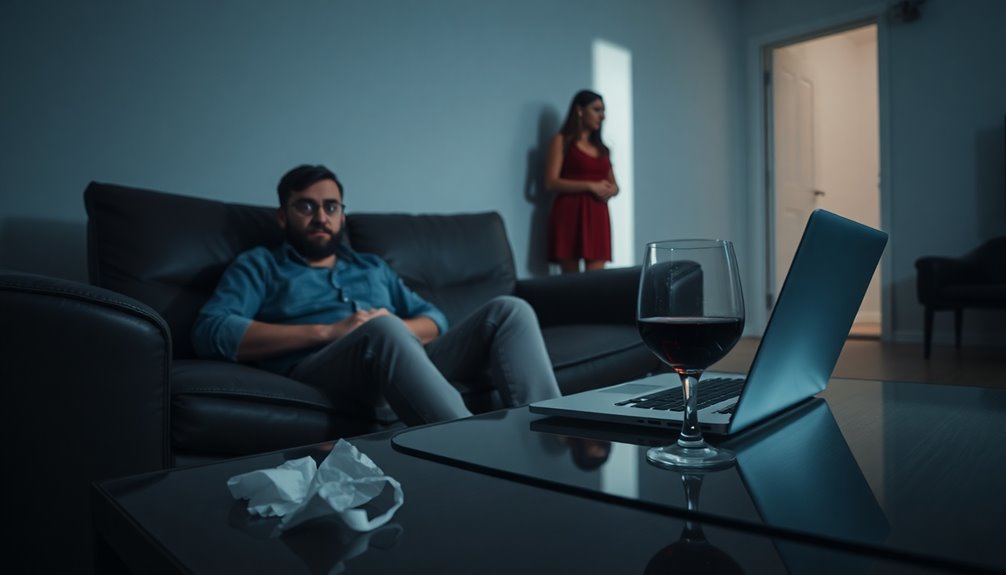Catching your husband watching porn can understandably raise concerns about trust and intimacy. While many people watch porn, it's important to reflect on how it affects both of you. Frequent use can lead to lower relationship satisfaction and emotional distance. You might also feel betrayed or struggle with self-doubt. If his behavior shifts to secrecy or dependency on porn for arousal, it could indicate a deeper issue. Open communication is key in understanding each other's feelings. Exploring these dynamics together can help you navigate your relationship more effectively and find common ground moving forward.
Key Takeaways
- Discovering your husband's porn use can lead to feelings of betrayal and trust issues, affecting your emotional connection.
- Consider the frequency and secrecy of his porn consumption, as these may indicate problematic or addictive behavior.
- Evaluate how his porn use impacts your relationship satisfaction and emotional intimacy, as it can contribute to dissatisfaction.
- Open communication about feelings and boundaries is essential for addressing concerns and rebuilding trust in your relationship.
- Seeking professional help, like couples therapy, can provide support and guidance for navigating this issue effectively.
Prevalence of Pornography Use

Pornography use is surprisingly common in America, with 58% of adults admitting they've watched it at least once. In fact, 27% of Americans have engaged with porn in the past month. When you look at the numbers, it's clear that this isn't just a niche behavior; 69% of men and 40% of women report viewing pornography annually. If you're one of the 1 in 3 Americans who seek out porn at least monthly, you're in a large group.
Demographically, men are four times more likely than women to have watched pornography recently, with 44% of men compared to just 11% of women. Younger audiences are especially active, with 57% of young adults seeking out porn frequently. Gender-diverse individuals also report higher levels of problematic use than women, though still lower than men. Moreover, the global prevalence rate of problematic pornography use is estimated at 16.6%, highlighting that these issues are not confined to individual experiences but are part of a larger trend. Understanding the impact of tea consumption on mental health may also provide insights into coping mechanisms for stress related to these behaviors.
Understanding these prevalence rates can help you frame your thoughts on your husband's habits. If you feel concerned or confused, remember that many others are maneuvering similar feelings. Recognizing the widespread nature of pornography use might provide some context as you explore your own relationship with this topic.
Understanding Your Feelings

Discovering your husband's pornography use can stir up a whirlwind of emotions, leaving you feeling vulnerable and confused. You might experience feelings of betrayal, triggering trust issues that can cloud your perception of your relationship. Anxiety and depression may creep in, making it hard to focus on anything else. It's common to feel guilt and shame, not just for your partner but also for yourself. The compulsive porn use can lead to increased anxiety and depression, further complicating your emotional response. Many individuals experiencing these feelings may also struggle with emotional dysregulation, making it difficult to manage intense emotions effectively.
You may find yourself questioning your attractiveness or sexual performance, which can affect your self-esteem. Comparing yourself to pornographic actors can exacerbate body image issues, leading to a distorted view of your worth. The emotional turmoil can feel isolating, as you navigate these feelings alone.
| Emotion | Possible Responses | Importance of Communication |
|---|---|---|
| Betrayal | Anger, sadness | Essential for healing |
| Anxiety | Overthinking, withdrawal | Helps in understanding |
| Guilt | Self-blame, shame | Crucial for rebuilding trust |
| Self-Doubt | Insecurity, comparison | Opens up dialogue |
Recognizing these emotions and their implications can be the first step toward addressing the core issues and fostering open communication in your relationship.
Impact on Relationships
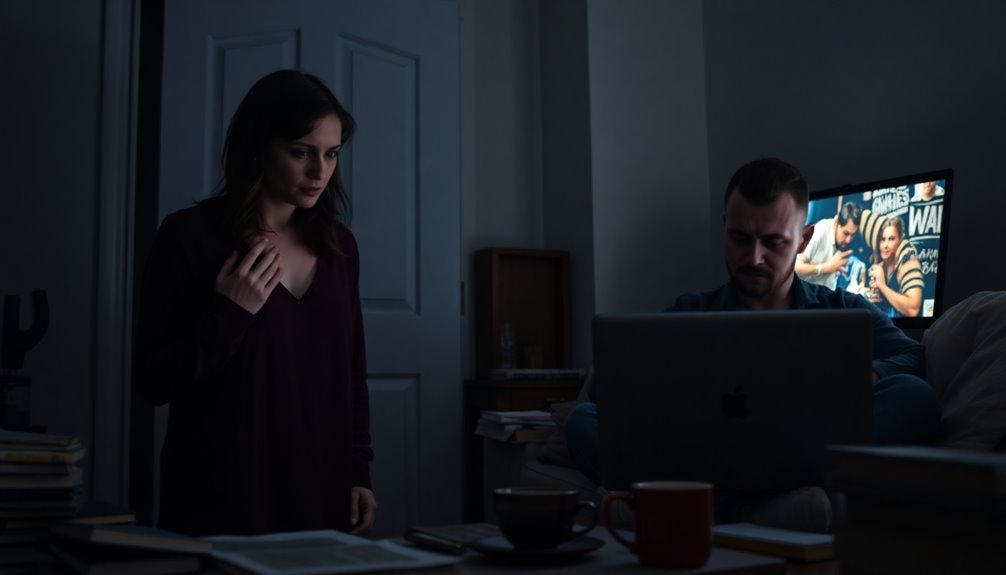
The revelation of a partner's pornography use can greatly disrupt the fabric of a relationship, leading to a cascade of negative effects on both emotional and sexual intimacy. You might find that your relationship satisfaction and stability take a hit, as research shows higher pornography use correlates with lower levels of both for couples. If you or your partner watch porn, either together or separately, it can lead to feelings of inadequacy and decreased sexual interest in one another. Additionally, studies indicate that even low levels of pornography consumption can have detrimental effects on relationship health.
As trust erodes due to dishonesty about pornography, communication often suffers, causing further conflict. You may notice that discussing sexual desires becomes more challenging, leading to feelings of exclusion and resentment. The differences in how each partner views pornography can contribute to relational aggression, making it harder to connect emotionally. Furthermore, narcissistic behavior can exacerbate these issues, as individuals with such traits may struggle to empathize with their partner's feelings.
Moreover, if your partner struggles to get aroused without porn, it can create a cycle of decreased sexual satisfaction. This dynamic can lead to feelings of inadequacy on your part, fueling insecurity and potential infidelity. Overall, the impact of pornography use can jeopardize the core foundations of intimacy, trust, and communication in your relationship.
Signs of Potential Addiction
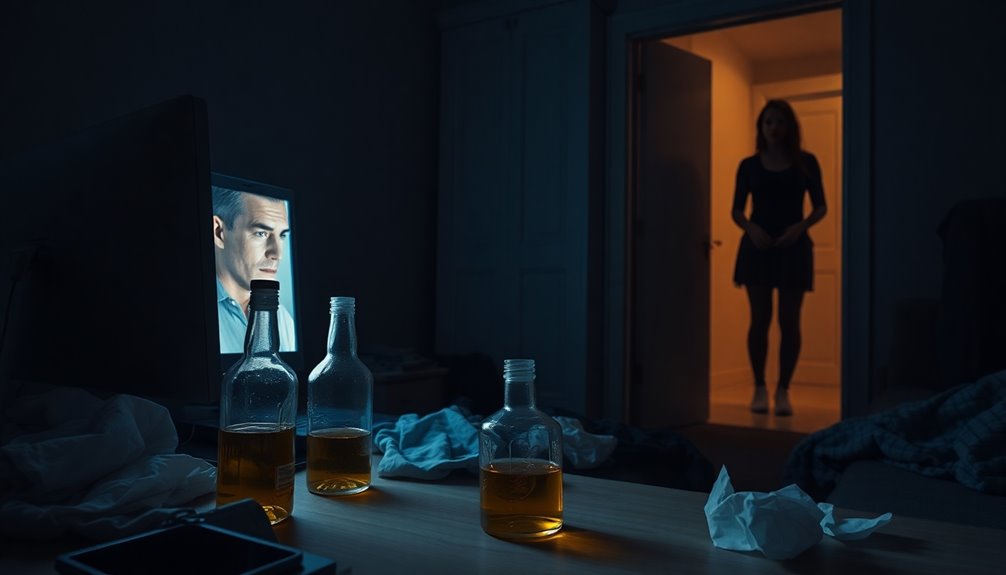
When signs of potential addiction to pornography emerge, it can be alarming for both partners in a relationship. Recognizing these signs early can help you address the issue before it spirals out of control. Here are some key indicators to watch for:
- Increased secrecy about porn use, feeling the need to hide it from loved ones.
- A shift in sexual behavior, like needing porn to feel aroused or losing interest in real intimacy. This change may indicate a lack of healthy boundaries that can impact emotional connection.
- Escalating frequency and extremity of porn consumption, often requiring more extreme content for satisfaction.
- Negative effects on daily life, such as neglecting responsibilities or self-care. Compulsion to view porn can replace emotional connections in relationships.
- Withdrawal symptoms when unable to access porn, which can include anxiety, irritability, and fatigue.
If you notice these signs, it's vital to take them seriously. They may indicate a deeper issue that could impact not only your partner but your relationship as well. Being aware of these potential red flags can help you navigate the situation more effectively, ensuring that both of you stay emotionally connected and healthy.
Communication With Your Partner

Addressing potential addiction to pornography can be challenging, but open communication with your partner is key to steering through this sensitive issue. Start by approaching the discussion with empathy. Share your feelings and concerns without judgment to create a safe space for dialogue. It's essential to listen actively, allowing your partner to express their views fully. Avoid interruptions; this helps validate their feelings and fosters understanding.
Set clear expectations around pornography use together. Discuss boundaries, communication guidelines, and the importance of transparency. Talk about how pornography impacts your relationship and agree on shared values and goals. If the conversation becomes heated, take a break and return to it later to avoid escalation.
Recognizing the emotional and psychological effects of pornography is significant. Acknowledge feelings of betrayal or inadequacy that may arise. Show empathy towards your partner's struggles, as this opens the door to deeper understanding. Understanding the impact of addiction can help both partners navigate their emotions more effectively.
If necessary, consider seeking professional help, either through couples therapy or individual counseling. This can provide both of you with tools to navigate the complexities of addiction and restore intimacy. Ultimately, prioritizing communication strengthens your relationship and fosters healing.
The Role of Trust
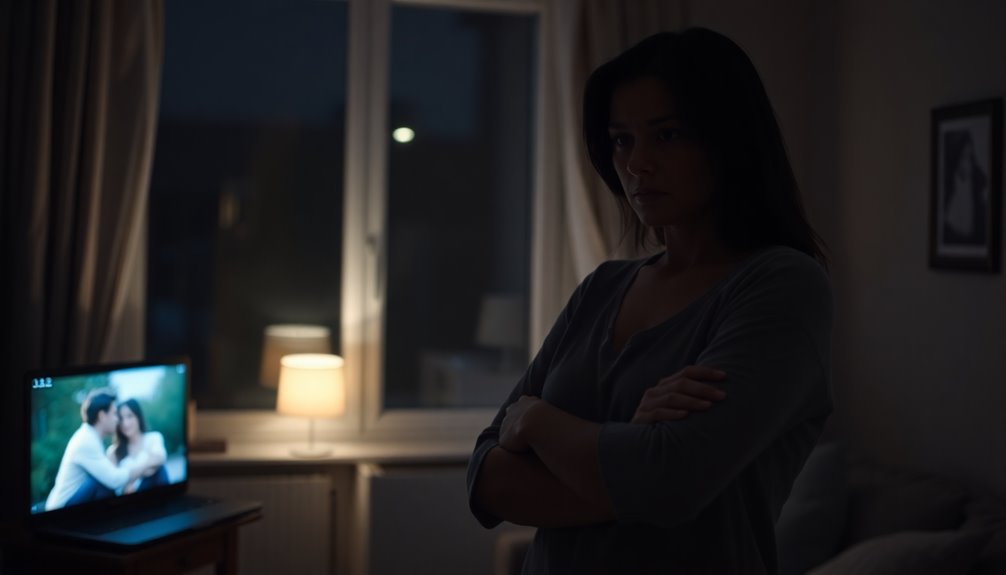
Trust plays an essential role in any relationship, especially when managing challenges like infidelity or issues related to pornography use. When trust is violated, it can lead to significant uncertainty and doubt about the relationship's foundation. You're left questioning everything, and the power dynamic shifts, complicating your emotional connection.
To navigate these challenges, consider the following key aspects of trust:
- Transparency: Full openness from your partner is critical for rebuilding trust.
- Accountability: The partner who violated trust must take responsibility for their actions.
- Time: Trust isn't rebuilt overnight; it requires patience and ongoing effort.
- Boundaries: Establishing clear boundaries can help both partners feel secure during recovery.
- Therapy: Engaging in couples therapy offers a structured approach to address trust issues.
Understanding these elements can help you both navigate the healing process. You act as the Trust Giver, determining whether to trust again, while your partner becomes the Trust Receiver, needing to earn back your confidence. Recognizing these roles is essential in moving forward and potentially restoring your relationship. Moreover, addressing underlying relationship issues can foster a stronger bond as you work through trust challenges together. Additionally, effective communication strategies are vital in overcoming emotional volatility during this trying time.
Health and Psychological Effects
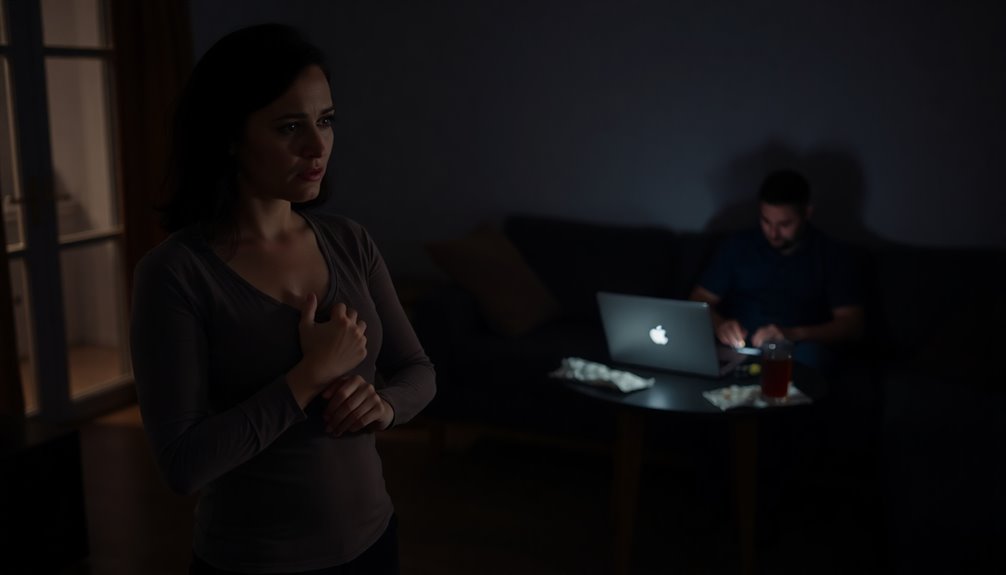
Managing the complexities of a relationship can be challenging, especially when pornography use comes into play. You might find that problematic pornography use can lead to significant distress, impacting your daily life, personal relationships, and mental health. Early exposure, particularly among young people, can result in negative developmental outcomes, such as skewed attitudes towards sexual behavior and increased acceptance of sexual harassment.
Moreover, frequent pornography consumption is often linked to lower sexual desire and satisfaction. Compulsive use can impair decision-making and create a heightened response to sexual stimuli, complicating emotional and relational dynamics. Psychologically, it can lead to emotional disturbances like anxiety and depression, and it may foster unrealistic expectations about sex and gender roles. Recent research suggests that excessive porn use can lead to compulsive behaviors that may result in severe emotional distress. Additionally, understanding the health and psychological effects of emotional disturbances can help individuals recognize when they might need support.
You should also consider how pornography can negatively affect your relationship. Studies suggest it's a strong predictor of declining marital quality. If there's disagreement over its use, it could lead to higher sexual dissatisfaction. Understanding these health and psychological effects is essential to maneuvering your feelings and the dynamics in your relationship, and it may help you make informed decisions moving forward.
Navigating Cultural Attitudes
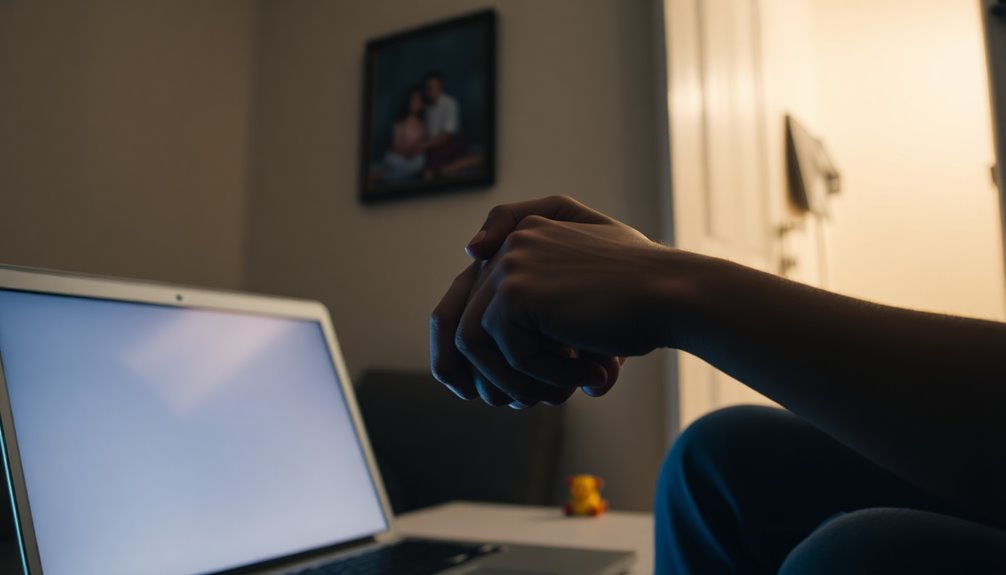
While steering through cultural attitudes toward pornography, it's vital to recognize that these beliefs can shape not only personal views but also relational dynamics. Different cultures hold varying beliefs about pornography, often influenced by factors like education, gender roles, and religiosity. Understanding these cultural nuances can help you navigate your feelings and reactions when it comes to your husband's behavior.
Consider these key points:
- Cultural Variation: European and American cultures tend to be more liberal compared to conservative Asian and African societies. This variation can impact perceptions of infidelity and trust, making conversations about pornography crucial in understanding relationship dynamics.
- Gender Differences: Men often report higher consumption and acceptance of pornography, while women may have more negative attitudes, especially in conservative communities.
- Religious Influence: Higher levels of religiosity may lead to negative views on pornography, despite a paradoxical attraction to sexual contexts.
- Educational Impact: Post-high school education is linked to more liberal views on pornography.
- Social Norms: Family and community values play a significant role in shaping individual perspectives. Additionally, cultural and religious values significantly influence women's attitudes towards pornography consumption.
Seeking Help and Support

If you find yourself grappling with the implications of your husband's pornography use, seeking help and support is a significant step toward healing. Understanding that about 75% of men engage with porn can help normalize your feelings, but it doesn't diminish the emotional trauma you may be experiencing. Many partners report feelings of betrayal and anger, and it's important to address these emotions head-on. Consider professional help, such as conjoint couple therapy, which can provide a structured environment for both of you to heal. A 12-step program may also offer a clear path for recovery. It's important to recognize that good intentions alone aren't enough; counseling can aid in breaking the cycle of addiction. Studies show that persistent gender differences in pornography use can complicate these discussions, making communication even more essential.
Open communication is critical. Engaging in dynamic communication exercises can help both partners express their feelings more openly. Discussing the issue can foster trust and understanding. Joining support groups can connect you with others facing similar challenges, providing a sense of community. Educating yourself about the negative effects of porn can empower you to take informed steps forward. Remember, seeking help is not a sign of weakness; it's a brave decision toward healing and rebuilding your relationship.
Moving Forward Together

Moving forward together requires a commitment to rebuilding trust and connection in your relationship. It's crucial to address the immediate impact of discovering your husband's pornography use. You may feel a mix of emotions, from anger to inadequacy, but you can navigate this path together. Here are key steps to contemplate: Open and honest communication is essential, allowing both of you to express your feelings and concerns while fostering understanding. If your husband wanting sex constantly has become a recurring issue tied to this discovery, it’s important to explore the underlying factors and how they may be affecting your emotional and physical connection. Seeking professional counseling or therapy can provide a safe space to address these challenges and work toward healing together.
- Open Communication: Share your feelings and fears honestly.
- Rebuild Intimacy: Focus on emotional closeness and prioritize healthy sexual experiences. Research suggests that porn use doubles the likelihood of divorce, which may be a concern to address together.
- Set Boundaries: Discuss and agree on what's acceptable in your relationship.
- Seek Professional Help: Reflect on couples therapy for guided support.
- Practice Transparency: Guarantee honesty about past and present behaviors.
Frequently Asked Questions
Is Occasional Porn Use Normal in a Marriage?
Imagine a river flowing through your marriage, sometimes meandering into unexpected waters. Occasional porn use can be normal in a marriage, as many couples navigate this terrain together. It often reflects personal curiosity rather than a lack of intimacy. However, communication's essential—sharing thoughts and feelings about it can strengthen your bond. If it becomes a source of tension or secrecy, that's when you might want to reevaluate its place in your relationship.
How Can I Differentiate Between Casual Viewing and Addiction?
To differentiate between casual viewing and addiction, pay attention to patterns in behavior. If you notice secrecy, agitation when questioned, or increased time spent alone with devices, these may indicate a problem. Evaluate whether porn use interferes with daily responsibilities or affects your emotional connection with partners. Consider if there's a growing need for more extreme content or feelings of shame surrounding the use. Open communication is essential in understanding the situation better.
What if My Husband Views Porn but Claims It's Harmless?
If your husband views porn but claims it's harmless, you might want to reflect on how it affects your relationship. Even casual viewing can lead to decreased emotional closeness and trust issues. Discuss your feelings openly, as differing views on pornography can create misunderstandings. It's crucial to evaluate whether his viewing habits impact your intimacy and connection. Being honest about your boundaries and needs can help you both navigate this sensitive topic.
Can Porn Use Ever Be Beneficial for a Relationship?
Porn use can be beneficial for a relationship when approached openly and consensually. It can enhance emotional and sexual connections by fostering communication about desires and preferences. Watching it together might add excitement and a sense of adventure, reigniting attraction. However, it's essential to guarantee both partners feel comfortable and engaged in the experience. Establishing trust and mutual understanding can help maximize the positive impacts while minimizing potential risks to your relationship.
How Do I Address My Own Feelings About Porn Consumption?
Addressing your feelings about porn consumption is like maneuvering through a maze; it can be confusing but rewarding. Start by reflecting on why it bothers you. Are there feelings of insecurity or betrayal? Talk openly about these emotions with someone you trust, or even consider journaling your thoughts. Understanding your feelings is vital. Remember, it's okay to set boundaries and prioritize your well-being in any relationship, as you deserve to feel secure and valued.
